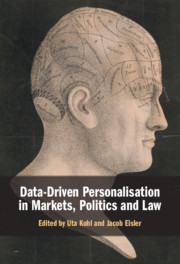Book contents
- Data-Driven Personalisation in Markets, Politics and Law
- Data-Driven Personalisation in Markets, Politics and Law
- Copyright page
- Contents
- Figures
- Tables
- Contributors
- Preface
- Part I Introduction: Theoretical Perspectives
- Part II Themes: Personal Autonomy, Market Choices and the Presumption of Innocence
- Part III Applications: From Personalised Medicine and Pricing to Political Micro-Targeting
- 9 ‘P4 Medicine’ and the Purview of Health Law: The Patient or the Public?
- 10 Personalised Pricing: The Demise of the Fixed Price?
- 11 Data-Driven Algorithms in Criminal Justice: Predictions as Self-fulfilling Prophecies
- 12 From Global Village to Smart City: Reputation, Recognition, Personalisation, and Ubiquity
- 13 Micro-targeting in Political Campaigns: Political Promise and Democratic Risk
- Part IV The Future of Personalisation: Algorithmic Foretelling and Its Limits
- Index
11 - Data-Driven Algorithms in Criminal Justice: Predictions as Self-fulfilling Prophecies
from Part III - Applications: From Personalised Medicine and Pricing to Political Micro-Targeting
Published online by Cambridge University Press: 09 July 2021
- Data-Driven Personalisation in Markets, Politics and Law
- Data-Driven Personalisation in Markets, Politics and Law
- Copyright page
- Contents
- Figures
- Tables
- Contributors
- Preface
- Part I Introduction: Theoretical Perspectives
- Part II Themes: Personal Autonomy, Market Choices and the Presumption of Innocence
- Part III Applications: From Personalised Medicine and Pricing to Political Micro-Targeting
- 9 ‘P4 Medicine’ and the Purview of Health Law: The Patient or the Public?
- 10 Personalised Pricing: The Demise of the Fixed Price?
- 11 Data-Driven Algorithms in Criminal Justice: Predictions as Self-fulfilling Prophecies
- 12 From Global Village to Smart City: Reputation, Recognition, Personalisation, and Ubiquity
- 13 Micro-targeting in Political Campaigns: Political Promise and Democratic Risk
- Part IV The Future of Personalisation: Algorithmic Foretelling and Its Limits
- Index
Summary
Data-driven algorithms are increasingly used by penal systems across western jurisdictions to predict risks of recidivism. This chapter draws on Foucauldian analysis of the epistemic power of discourse to demonstrate how the algorithms are operating as truth or knowledge producers through the construction of risk labels that determine degrees of penal governance and control. Some proponents emphasise the technical fairness of the algorithms, highlighting their predictive accuracy. But in its exploration of the algorithms and their design configurations as well as their structural implications, this paper unravels the distinctions between a criminal justice and a social justice perspective on algorithmic fairness. It argues that whilst the former focuses on the technical, the latter emphasises broader structural consequences. These include impositions of algorithmic risk labels that operate as self-fulfilling prophesies, triggering future criminalisation and consequently undermining the perceived legitimacy of risk assessment and prediction. Through its theorisation of these issues, the chapter expands the parameters of current scholarship on the predictive algorithms applied by penal systems.
Keywords
- Type
- Chapter
- Information
- Data-Driven Personalisation in Markets, Politics and Law , pp. 190 - 204Publisher: Cambridge University PressPrint publication year: 2021
- 3
- Cited by

